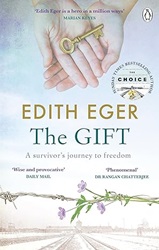
 The Gift
The Gift12 Lessons to Save Your Life
Review posted May 6, 2024.
Scribner, 2020. 195 pages.
Review written July 15, 2021, from a library book.
Starred Review
Edith Eger is a doctor of psychology and a Holocaust survivor. So when she fills a book with life lessons, she can use examples from her own life and from her patients’ lives. And you know the lessons will be helpful, even in extreme situations.
The subtitles of the twelve chapters tell you what major life issues each lesson deals with: Victimhood, Avoidance, Self-Neglect, Secrets, Guilt and Shame, Unresolved Grief, Rigidity, Resentment, Paralyzing Fear, Judgment, Hopelessness, and Not Forgiving. Her lessons and stories are practical and pointed. For example, the chapter about Judgment is titled “The Nazi In You,” and she talks about meeting an American teen in the 1980s who was wearing a brown shirt and brown boots and ranting about killing Jews and others and making America white again. She took a deep breath and said, “Tell me more.”
It was a tiny gesture of acceptance – not of his ideology, but of his personhood. And it was enough for him to speak a little of his lonely childhood, absentee parents, and severe neglect. Hearing his story reminded me that he hadn’t joined an extremist group because he was born with hate. He was seeking what we all want: acceptance, attention, affection. It’s not an excuse. But attacking him would only nourish the seeds of worthlessness his upbringing had sown. I had the choice to alienate him further, or give him another version of refuge and belonging.
Another bit I like is her tip in the chapter on hopelessness: “Don’t cover garlic with chocolate.”
It’s tempting to confuse hope with idealism, but idealism is just another form of denial, a way of evading a true confrontation with suffering. Resiliency and freedom don’t come from pretending away our pain. Listen to the way you talk about a hard or hurtful situation. It’s okay. It’s not that bad. Others have it so much worse. I don’t have anything to complain about. Everything will work out in the end. No pain, no glory! The next time you hear yourself using the language of minimization, delusion, or denial, try replacing the words with “It hurts. And it’s temporary.” Remind yourself, “I’ve survived pain before.”
I also appreciated the insight in the chapter, “There’s No Forgiveness Without Rage.” I’ve seen that in other books, with explanations of how you need to admit there’s pain and wrongdoing before you can forgive it. You need to feel the hurt rather than dismiss it. This idea There’s no forgiveness without rage. is even simpler.
Those are just a few examples of the hard-won wisdom found in this book, told with warmth and love.
